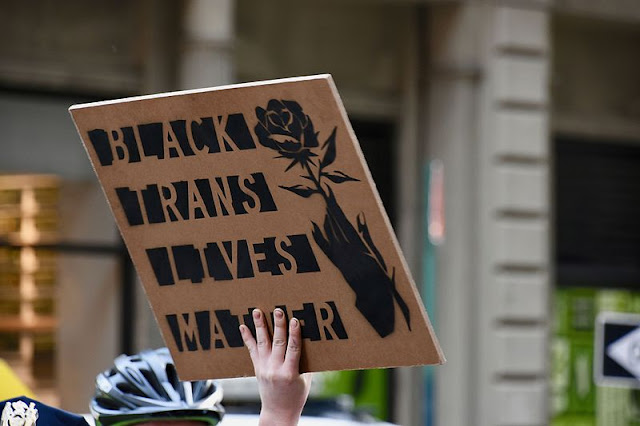It Wasn’t a Party—It Was a Riot
By Beryl Baker and Livian Yeh
According to the Human Rights Campaign, the transgender and gender nonconforming community are especially vulnerable against fatal violence. In 2019, advocates from the organization tracked at least 27 deaths of transgender or gender nonconforming people in the United States, and found the victims were mostly Black transgender women. In 2020, at least 15 transgender or gender nonconforming people have been killed by violent means.
Art Hoe Collective
BGD Press Books
Black Trans Femmes in the Arts
Southern Fried Queer Pride
The Star Fruit Project
Some other organizations to support:
Black Visions Collective
Black Trans Travel Fund
Black Transmen Inc
Brave Space Alliance
Center for Black Equity
For the Gworls
Homeless Black Trans Women Fund
House of GG
The Knights & Orchids Society
The Marsha P. Johnson Institute
The Okra Project
Transgender Gender-Variant & Intersex Justice Project
Trans Women of Color Collective
Further Readings:
Nina Simone on freedom and fear
Violence Against the Transgender and Gender Non-Conforming Community in 2020
Screaming Queens | KQED Truly CA
Laverne Cox’s Disclosure
Remembering San Francisco's Compton's Cafeteria Riot
San Francisco Pride is turning 50 this year amid a global pandemic and worldwide protests against police brutality and systemic racism. In response to questions about the upcoming virtual celebration and rally, San Francisco Pride board president Carolyn Wysinger expressed support of the protesters and highlighted the especially vulnerable Black trans community. “Stonewall was started by a Black trans woman. Stonewall was a defense of Black bodies,” says Wysinger. “In honor of this, San Francisco Pride will use this moment to lift up and center our Black LGBTQ+ community members.” The woman Wysinger referred to was Marsha P. Johnson, a Black transgender activist and performer credited with throwing the first brick at Stonewall. As the saying goes, Pride didn’t start as a party—it was a riot, and members of the LGBTQ+ community have long fought back against police harassment and discrimination.
 |
| Photo courtesy of Wikipedia Commons. |
According to the Human Rights Campaign, the transgender and gender nonconforming community are especially vulnerable against fatal violence. In 2019, advocates from the organization tracked at least 27 deaths of transgender or gender nonconforming people in the United States, and found the victims were mostly Black transgender women. In 2020, at least 15 transgender or gender nonconforming people have been killed by violent means.
The more invisible we make a community, the more vulnerable they become. At A.C.T., we understand the power of the arts in challenging perspectives, bringing unheard voices to the forefront, and uplifting those who have been most vulnerable. We also know the arts and media can just as easily uphold stereotypes, exclude voices, and make light of historical trauma. Representation literally saves lives, and here is a list of Black trans artists and arts organizations you can support:
Art Hoe Collective
BGD Press Books
Black Trans Femmes in the Arts
Southern Fried Queer Pride
The Star Fruit Project
Artists and citizens alike have the power to break the cycle of Othering and bring underrepresented voices to the forefront. As Marsha P. Johnson said, “You never completely have your rights, one person, until you have all your rights.”
Some other organizations to support:
Black Visions Collective
Black Trans Travel Fund
Black Transmen Inc
Brave Space Alliance
Center for Black Equity
For the Gworls
Homeless Black Trans Women Fund
House of GG
The Knights & Orchids Society
The Marsha P. Johnson Institute
The Okra Project
Transgender Gender-Variant & Intersex Justice Project
Trans Women of Color Collective
Further Readings:
Nina Simone on freedom and fear
Violence Against the Transgender and Gender Non-Conforming Community in 2020
Screaming Queens | KQED Truly CA
Laverne Cox’s Disclosure
Remembering San Francisco's Compton's Cafeteria Riot

